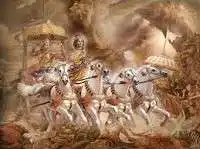
Two Great Epics
Read the passages given below and answer the questions that follow them:
1. The two great epics of ancient India – The Ramayana and the Mahabharata — probably took shape in the course of several hundred years, and even subsequently, additions were made to them. They deal with the early days of the Indo-Aryans, their conquests and civil wars when they were expanding and consolidating themselves, but they were composed and compiled later. I do not know of any books anywhere which have exercised such a continuous and pervasive influence on the mass mind as these two. Dating back to remote antiquity, they are still a living force in the life of the Indian people. Not in the original Sanskrit, except for a few intellectuals, but in translations and adaptations, and in those innumerable ways in which tradition and legend spread and become a part of the texture of a person’s life. They represent the typical Indian method of catering all together for various degrees of cultural development, from the highest intellectual to the simple unread and untaught villager. They make us understand somewhat the secret of the old Indians in holding together a variegated society divided up in many ways and graded in castes, in harmonizing their discords and giving them a common background of heroic tradition and ethical living. Deliberately, they tried to build up the unity of outlook among the people, which was to survive and overshadow all diversity.
2. Among the earliest memories of my childhood are the stories from these epics told to in by my mother or the older ladies of the house, just as a child in Europe or America might listen to fairy tales or stories of adventure. There was for me both adventure and the fairy element in them. And, then, I used to be taken every year to the popular, open-air performances where the Ramayana story was enacted and vast crowds came to see it and join in the processions. It was all very crude, but that did not matter, for everyone knew the story by heart and it was carnival time.
Word-Meaning: Epics—long poems in heroic style, Subsequently—afterwards, Composed—written, Compiled—collected from various sources, Pervasive— widespread, fated, Antiquity—old times,such Adaptations—making suitable for, Innumerable—numberless, Legend—old stories, Texture–mould, Variegated—of different colours, Graded—in different grades/classes, Harmonizing—reconciling Discords—conflicts, Ethical—moral, Survive—left alive, Overshadow—hide, dominate, Diversity—variety, Carnival—festival of merriment
Attempt any eight of the following questions on the basis of the passage you have read.
1. Name the two great epics of ancient India.
2. How much time did the great epics take to shape?
3. What do the great epics deal with?
4. How do these epics have a pervasive influence on the masses?
5. How do the great epics try to build up the unity of outlook among the people?
6. How did the narrator have the stories told in his childhood?
7. How did the narrator enjoy the stories of the epics?
8. How was the Ramayana story enacted?
9. Find a word in paragraph 1 that means ‘long poems in heroic style’.
Answers
1. The two great epics of ancient India are—`The Ramayana and the Mahabharata’.
2. It took several hundred years to shape them and even subsequently, additions were made to them.
3. The great epics deal with the early days of the Indo-Aryans, their conquests, civil wars and their consolidation.
4. These epics have exercised a continuous and pervasive influence on the masses. They have become a part of the texture of their lives.
5. They help in understanding how Indians held together with a divided society in the past. They harmonized their discords and gave them a common tradition and ethical living.
6. The narrator got those stories from the epics told by his mother and other older ladies in his childhood.
7. The narrator enjoyed both the adventures and the fairy elements in the stories.
8. The Ramayana story was enacted in the open-air and in the processions.
9. Epics. Passage -71 Word Blindness (350 Words Subjective Unsolved) Passage -72 Medicine (350 Words Subjective Solved) Passage -73 Indian Mythology (350 Words Subjective Solved) Passage -74 Independence (350 Words Subjective Solved) Passage -75 Goals and Objectives (350 Words Subjective Solved) Passage -76 Obesity (350 Words Subjective Solved) Passage -77 Bleak Economy (350 Words Subjective Solved) Passage -78 Gospel Truth (400 Words Subjective Solved) Passage -79 Visitors to Kutch (400 Words Subjective Solved) Passage -80 Modern Technology (350 Words Subjective Solved)More Comprehension Pasages:-